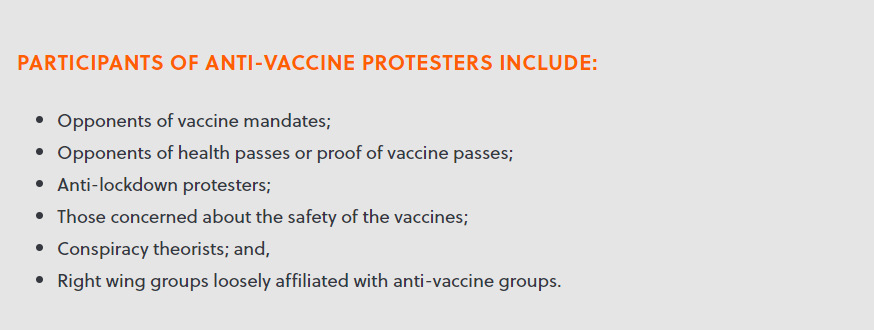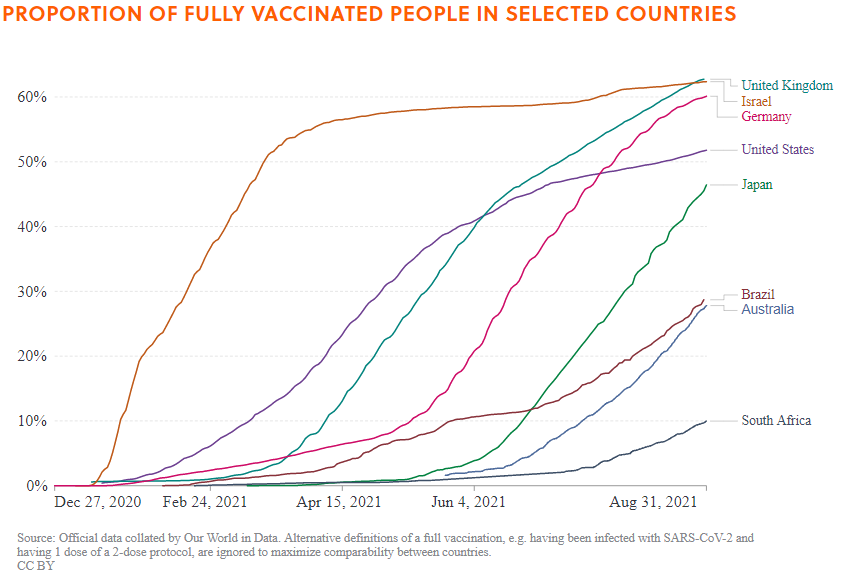Global protests: Taking a jab at Covid-19 vaccinations
It was perhaps inevitable. Since the outset of the pandemic, lockdowns, the wearing of facemasks and social distancing protocols have faced fierce resistance from certain quarters. Little surprise then, that as national Covid-19 vaccination programmes have been rolled out since the turn of the year, anti-vaccination protests have gained momentum in countries across the world.
A MIXED CROWD
The protests have typically attracted crowds of a few dozen people, but recent protests in France saw more than a hundred thousand take part countrywide. Protest sites have varied, but typically include town squares, the fronts of government buildings or hospitals, or other institutions such as media houses seen as antagonistic toward the anti-vaccine cause. The protests are decentralised, comprising a variety of groups and individuals, with differing and sometimes contradicting concerns and demands.
This isn’t a new movement; some of those involved have previously protested against lockdowns and other Covid-19 restrictions, and have now turned their attention to the vaccine and vaccine mandates. In the US, Greece, Germany, and Italy, far-right groups who oppose government restrictions have also joined anti-vaccine protests, portraying vaccine drives as a symbol of excessive government control. Far-right groups have tried to capitalise on some of the underlying factors driving anti-vaccine protests such as misinformation, lack of trust in governments and science, and the perceived attack on personal liberties for their own ends.

VACCINE HESITANCY
In recent months, several countries in Europe have recorded spikes in Covid-19 infections amid a slowdown in vaccine uptake. Recent data shows that 33 member states of the World Health Organisation (WHO) Europe have recorded an increase in infections greater than 10 percent since 15 August. The surge in infections comes despite a large percentage of Europe’s population having already been vaccinated: 29 countries in the region have administered at least one dose to 75.1 percent of adults and two doses to 64.9 percent of adults.
On 30 August, WHO’s Europe director, Hans Kluge, attributed the drop in vaccination uptake and the subsequent rise in infection rates to more infectious variants, but also to science denialism and vaccine scepticism. Despite these concerns, globally vaccine rates have continued to tick upwards, though the trajectories and rates do vary.
Anti-vaccine sentiment has been fuelled by a proliferation of misinformation across social media platforms, and in some cases, low levels of trust in government. In Papua New Guinea (PNG), the government directly blamed fake news and online conspiracies for sluggish vaccine rates. In June, a local online survey in PNG found that 77 percent of locals did not want to be vaccinated. This was duly reflected in the vaccination uptake. By July, approximately three months after PNG launched its Covid-19 vaccine rollout, only 60,000 – or 0.6 percent of the population – had received their first dose, with many people including healthcare workers hesitant due to misinformation about the vaccine.
Some countries have faced structural challenges in getting their populations vaccinated. A University of Johannesburg survey in July 2021 found that 72 percent of South Africans have a positive view of the vaccine. But it has been the lack of access to vaccination sites and healthcare centres that has slowed uptake; the country’s supply of vaccines now outstrips demand. Bulgaria has also struggled to get its population vaccinated, though for different reasons. Conflicting information from authorities and historically high levels of distrust in government have resulted in vaccine hesitancy extending even to healthcare workers, with 30 percent of doctors and 60 percent of nurses unvaccinated.

A LARGE IMPACT
Anti-vaccine protests and vaccine hesitancy threatens to impact public health and increase infection rates, as those who are not vaccinated are more likely to infect others. Data from the Centers for Disease Control and Prevention show that unvaccinated people are 29 times more likely to be hospitalised with Covid-19 compared to fully vaccinated people. As infection rates increase, governments are faced with the prospect of extending or renewing lockdown restrictions. But these come with an economic cost: data from the Organisation for Economic Co-operation and Development (OECD) show that the global GDP contracted by 3.5 percent in 2020 due the Covid-19 pandemic and the associated lockdowns and restrictions.
Anti-vaccine protests and vaccine hesitancy threatens to impact public health and increase infection rates, as those who are not vaccinated are more likely to infect others.
Both government and businesses will likely seek to employ various measures to get more people vaccinated. Some businesses have implemented vaccine mandates for both their staff and customers, while governments in countries such Australia, Saudi Arabia, and Brazil have adopted vaccine mandates for various groups including aged care workers and public sector employees. More coercive measures and mandates have the potential to escalate protests and retaliatory measures by groups who already have low levels of trust in government and private companies. In France, demonstrators have held weekly – and sometimes violent – protests since July 2021 to denounce vaccine mandates for healthcare workers, and against the requirement that health passes be presented to access shops and other services. In the UK and elsewhere, protesters have targeted media organisations for promoting vaccines.
A DIFFERENT APPROACH
Each country faces an almost unique challenge in getting their population vaccinated, a goal that medical experts suggest is the only way to successfully curb the pandemic. In aiming to achieve this, governments will face a difficult task trying to either compel or entice people to get vaccinated. Indonesia has been able to enforce blanket mandates on all its citizens and has opted to punish those who refuse the vaccine by stopping or delaying social welfare payments or imposing fines. But this won’t work everywhere. Countries that hesitate to employ such coercive measures will instead need to find more creative solutions to dispel protesters and encourage vaccinations. Whether they are successful or not may determine the future course of the pandemic.
